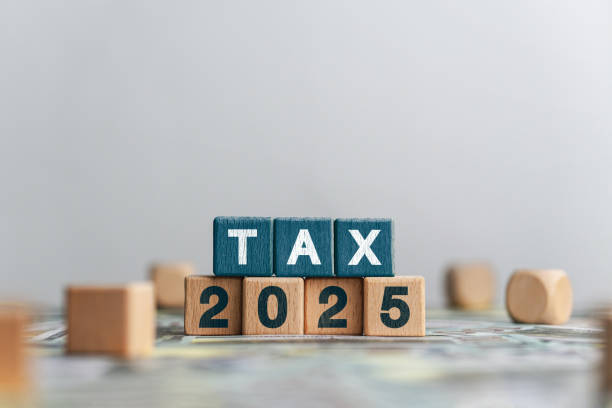IRS 2025 tax bracket adjustments: What you need to know

The IRS has announced key tax adjustments for the 2025 tax year, impacting the tax brackets, standard deduction, and various tax benefits.
These changes are crucial for all US taxpayers, especially expatriates, as they bring some important benefits and considerations for tax planning.
Here's a detailed breakdown of the 2025 tax brackets and what they mean for you.
2025 tax bracket adjustments
Inflation-adjusted tax brackets
For 2025, the IRS has adjusted income tax brackets for inflation, meaning the income thresholds for each bracket have increased.
This helps ensure that taxpayers don't see their tax liability rise simply because their incomes have kept pace with inflation.
The new tax brackets are as follows:
For single filers:
- 10%: Up to $11,925
- 12%: $11,926 to $48,475
- 22%: $48,476 to $103,350
- 24%: $103,351 to $197,300
- 32%: $197,301 to $250,525
- 35%: $250,526 to $626,350
- 37%: Over $626,351
For head of household:
- 10%: Up to $17,000
- 12%: $17,001 to $64,850
- 22%: $64,851 to $103,350
- 24%: $103,351 to $197,300
- 32%: $197,301 to $250,500
- 35%: $250,501 to $626,350
- 37%: Over $626,351
For married filing jointly or surviving spouse:
- 10%: Up to $23,850
- 12%: $23,851 to $96,950
- 22%: $96,951 to $206,700
- 24%: $206,701 to $394,600
- 32%: $394,601 to $501,050
- 35%: $501,051 to $751,600
- 37%: Over $751,601
For married filing separately:
- 10%: Up to $11,925
- 12%: $11,926 to $48,475
- 22%: $48,476 to $103,350
- 24%: $103,351 to $197,300
- 32%: $197,301 to $250,525
- 35%: $250,526 to $375,800
- 37%: Over $375,801
These inflation adjustments will significantly impact your tax liability if your income has increased due to cost-of-living raises, but you haven't seen substantial real income growth.
The standard deduction increases
The standard deduction is a key component of tax planning for many taxpayers.
For 2025, the standard deduction has also been adjusted upward, offering a larger reduction in taxable income.
Here are the new figures:
- Single filers: $15,000 (up from $14,600 in 2024)
- Married couples filing jointly: $30,000 (up from $29,200 in 2024)
- Head of household: $22,500 (up from $21,900 in 2024)
This means that individuals can deduct more of their income before being taxed, which reduces the overall tax liability.
Impact on US expats
For US expats, these adjustments bring both opportunities and challenges.
The inflation adjustments to tax brackets benefit expats just like domestic taxpayers, but there are unique factors to consider:
- Foreign Earned Income Exclusion (FEIE): Expats can exclude up to $130,000 (in 2025) of foreign earned income from US taxation, so changes in the tax brackets won’t affect this exclusion directly. However, higher brackets may impact any income above the FEIE limit.
- Foreign Tax Credit (FTC): Expats who live in countries with higher taxes may be able to offset some of their US tax liability using the Foreign Tax Credit. The inflation-adjusted tax brackets may allow for more flexibility in utilizing this credit, as more income may be eligible for a reduced US tax rate.
- Tax planning for expats: For those living in high-cost countries, like the UK, Switzerland, or Japan, these adjustments offer opportunities for tax planning. Expats might need to reassess their strategies for retirement contributions, as higher contribution limits could help reduce taxable income. Moreover, expats should be mindful of how inflation adjustments could affect their state-side tax obligations.
What you need to do now
- Reevaluate your tax strategy: The changes to the tax brackets, standard deduction, and other tax benefits mean that you might owe less tax in 2025, but you still need to strategize. Take the time to reassess your situation and adjust your withholding or estimated payments accordingly.
- Maximize retirement contributions: The IRS has also increased contribution limits for 401(k)s, IRAs, and other retirement accounts. For example, the limit for 401(k) contributions for individuals under 50 will increase to $22,500, while those 50 and older can contribute up to $30,000. These higher limits offer additional opportunities for tax deferral and reducing taxable income.
Also read – 401(k) withdrawal penalty rule changes for 2024
Bottom line
The IRS's adjustments to tax brackets, standard deductions, and other benefits in 2025 are good news for many taxpayers, including US expats. These changes provide relief from bracket creep, a key concern in a time of inflation.
The updated brackets offer higher thresholds, making it easier for expats to navigate US tax law, especially when combined with tools like the Foreign Earned Income Exclusion and the Foreign Tax Credit.
Make sure you understand the full scope of these changes and adjust your tax strategy accordingly.
For personalized tax advice and strategies for your unique situation as an expat, don't hesitate to reach out to a qualified tax professional.
Taxes are complicated
Get peace of mind with TFX



